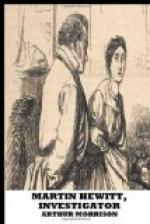We had scarcely seated ourselves before Hewitt broke into a torrent of conversation on the subject of bicycling. As our previous conversation had been of a literary sort, and as I had never known Hewitt at any other time to show the slightest interest in bicycling, this rather surprised me. I had, however, such a general outsider’s grasp of the subject as is usual in a journalist-of-all-work, and managed to keep the talk going from my side. As we went on I could see the face of the young man opposite brighten with interest. He was a rather fine-looking fellow, with a dark, though very clear skin, but had a hard, angry look of eye, a prominence of cheek-bone, and a squareness of jaw that gave him a rather uninviting aspect. As Hewitt rattled on, however, our neighbor’s expression became one of pleasant interest merely.
“Of course,” Hewitt said, “we’ve a number of very capital men just now, but I believe a deal in the forgotten riders of five, ten, and fifteen years back. Osmond, I believe, was better than any man riding now, and I think it would puzzle some of them to beat Furnivall as he was, at his best. But poor old Cortis—really, I believe he was as good as anybody. Nobody ever beat Cortis—except—let me see—I think somebody beat Cortis once—who was it now? I can’t remember.”
“Liles,” said the young man opposite, looking up quickly.
“Ah, yes—Liles it was; Charley Liles. Wasn’t it a championship?”
“Mile championship, 1880; Cortis won the other three, though.”
“Yes, so he did. I saw Cortis when he first broke the old 2.46 mile record.” And straightway Hewitt plunged into a whirl of talk of bicycles, tricycles, records, racing cyclists, Hillier, and Synyer and Noel Whiting, Taylerson and Appleyard—talk wherein the young man opposite bore an animated share, while I was left in the cold.
Our new friend, it seems, had himself been a prominent racing bicyclist a few years back, and was presently, at Hewitt’s request, exhibiting a neat gold medal that hung at his watch-guard. That was won, he explained, in the old tall bicycle days, the days of bad tracks, when every racing cyclist carried cinder scars on his face from numerous accidents. He pointed to a blue mark on his forehead, which, he told us, was a track scar, and described a bad fall that had cost him two teeth, and broken others. The gaps among his teeth were plain to see as he smiled.
Presently the waiter brought dessert, and the young man opposite took an apple. Nut-crackers and a fruit-knife lay on our side of the stand, and Hewitt turned the stand to offer him the knife.
“No, thanks,” he said; “I only polish a good apple, never peel it. It’s a mistake, except with thick-skinned foreign ones.”
And he began to munch the apple as only a boy or a healthy athlete can. Presently he turned his head to order coffee. The waiter’s back was turned, and he had to be called twice. To my unutterable amazement Hewitt reached swiftly across the table, snatched the half-eaten apple from the young man’s plate and pocketed it, gazing immediately, with an abstracted air, at a painted Cupid on the ceiling.




